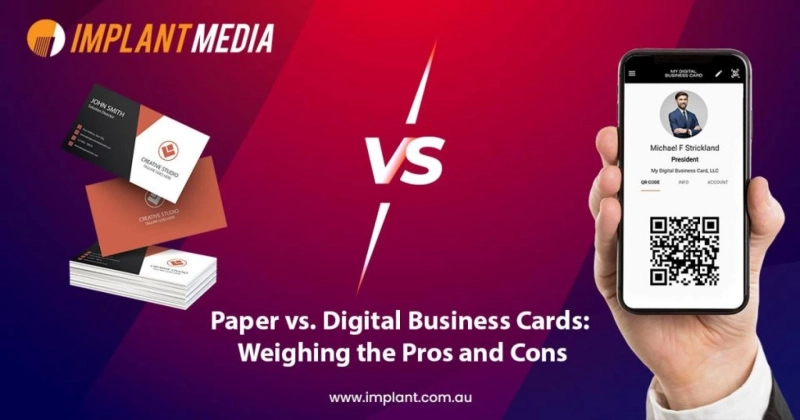Business CardsIn a rapidly evolving digital age, the debate over business card formats continues to gain momentum. The traditional practice of exchanging physical business cards faces competition from their digital counterparts. In this blog, we'll explore the advantages and disadvantages of both physical and electronic business cards, helping you determine which format aligns best with your professional needs.
Physical Business Cards
Pros of Physical Business Cards:
Tangible Impressions: Physical business cards provide a tangible and memorable connection. The texture, design, and quality of a paper card can leave a lasting impression on the recipient.
Personal Touch: Handing over a physical business card adds a personal touch to networking, reinforcing the value of face-to-face interactions.
Universal Accessibility: Physical business cards are universally understood and require no technical expertise. Anyone can receive and store them without needing specific apps or devices.
Brand Authenticity: Well-designed physical cards can reflect your brand's authenticity and commitment to quality.
Cons of Physical Business Cards:
Environmental Impact: The production and disposal of paper cards can have adverse environmental effects. The use of paper contributes to deforestation and waste.
Limited Information: Traditional business cards have limited space, making it challenging to include comprehensive information about your business.
Prone to Loss: Physical cards can be easily lost or damaged, rendering the information inaccessible.
Cost: Printing and designing physical business cards can be costly, especially when changes or updates are necessary.
Electronic Business Cards
Pros of Electronic Business Cards:
Eco-Friendly: Electronic business cards are environmentally friendly, as they eliminate the need for paper production and reduce waste.
Dynamic Content: They can contain dynamic content, such as links to your website, social media profiles, and even videos, allowing you to convey more information.
Accessibility: Electronic cards are easily accessible on various devices, making it convenient for recipients to access your contact information.
Real-Time Updates: Changes to your contact details or business information can be instantly updated on electronic cards, ensuring accuracy.
Cons of Electronic Business Cards:
Technical Dependencies: Recipients need compatible devices and apps to receive and save electronic business cards, which can be a limitation in certain situations.
Privacy Concerns: Sharing electronic business cards may raise concerns about data privacy and security.
Impersonal: Electronic cards lack the tactile experience of physical cards and may feel impersonal.
Limited Offline Use: In areas with poor or no internet connectivity, electronic cards may not be accessible.
Making the Choice
When deciding between physical and electronic business cards, consider the following factors:
Purpose: Think about your networking goals. If you prioritize a personal connection and brand authenticity, physical cards may be more suitable. If your priority is convenience and information-sharing, electronic cards might be better.
Audience: Consider the preferences of your target audience. Younger, tech-savvy professionals may appreciate electronic cards, while more traditional industries may still prefer physical ones.
Sustainability: Reflect on your commitment to sustainability. If you're environmentally conscious, electronic cards align better with eco-friendly practices.
Versatility: Evaluate your need for versatile information sharing. Electronic cards allow for more dynamic content, which can be crucial for some businesses.
Cost: Assess your budget for business card production. Electronic cards can be cost-effective, especially when considering the long-term savings.
Conclusion
The choice between physical and electronic business cards ultimately depends on your specific needs and preferences. While physical cards offer a tactile and personal connection, electronic cards provide convenience, versatility, and sustainability. In today's hybrid world, a combination of both types of business cards might be the ideal solution, ensuring you can adapt to the preferences of your networking contacts. By carefully considering the pros and cons, you can make an informed decision that aligns with your professional goals and values.
In the end, it's essential to choose the format that best serves your networking and branding objectives, keeping in mind the evolving dynamics of the professional world. Whether you opt for the traditional charm of physical business cards or the digital edge of electronic ones, the key is to make the most out of your business card interactions.


